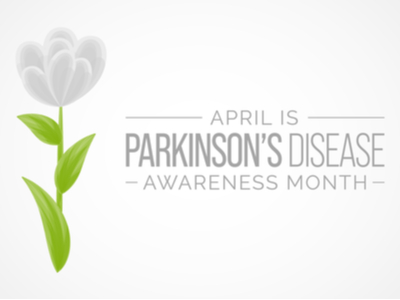
Picture of a flower. Photo says:
April is Parkinson's Disease Awareness Month.
April is Parkinson's Awareness Month
What is Parkinson's Disease?Parkinson's disease is a brain disorder that leads to shaking, stiffness, and difficulty with walking, balance, and coordination. Parkinson's symptoms usually begin gradually and get worse over time. Both men and women can have Parkinson's disease. However, the disease affects about 50 percent more men than women. One clear risk factor for Parkinson's is age. Although most people with Parkinson's first develop the disease at about age 60, about 5 to 10 percent of people with Parkinson's have "early-onset" disease, which begins before the age of 50.
What Causes Parkinson's Disease?
Parkinson's disease occurs when nerve cells, or neurons, in an area of the brain that controls movement become impaired and/or die. Normally, these neurons produce an important brain chemical known as dopamine. When the neurons die or become impaired, they produce less dopamine, which causes the movement problems of Parkinson's. Scientists still do not know what causes cells that produce dopamine to die.
Symptoms of Parkinson's Disease
Parkinson's Disease has four main symptoms:
Tremor (trembling) in hands, arms, legs, jaw, or head
Stiffness of the limbs and trunk
Slowness of movement
Impaired balance and coordination, sometimes leading to falls
Other symptoms may include depression and other emotional changes; difficulty swallowing, chewing, and speaking; urinary problems or urinary problems or constipation; skin problems; and sleep disruptions.
Early symptoms of Parkinson's Disease are subtle and occur gradually. Symptoms often begin on one side of the body or even in one limb on one side of the body. As the disease progresses, it eventually affects both sides. However, the symptoms may still be more severe on one side than on the other.
Treatment of Parkinson's Disease
Although there is no cure for Parkinson's Disease, medicines, surgical treatment, and other therapies can often relieve some symptoms. Treatments for Parkinson's include:
medications
deep brain stimulations
physical, occupational and speech therapy
healthy eating and exercise to strengthen muscles
Sabetha Community Hospital's Physical, Occupational and Speech Therapy Departments offer the program LSVT BIG™ and LOUD™ for people with Parkinson's Disease. These are a program tailored specifically to the patient to help them improve their movements and to be more comfortable in the everyday life movement. If you or someone you know who would benefit from these services, contact the Physical Therapy Department at (785) 284-1537 and ask about the LSVT BIG™ AND LOUD™ Program.
